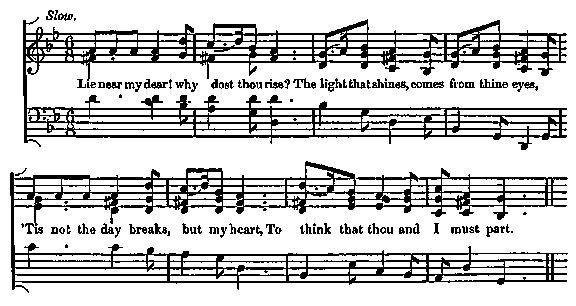Popular Music Of The Olden Time Vol 1
Ancient Songs, Ballads, & Dance Tunes, Sheet Music & Lyrics - online book
| Share page | Visit Us On FB |
|
REIGN OF ELIZABETH. |
173 |
||
|
LOTH TO DEPART.
Tune from Queen Elizabeth's Virginal Book, -where it is arranged by Giles Farnaby.
In Beaumont and Fletcher's Wit at several Weapons, act ii., sc. 2, Pompey makes his exit singing Loath to depart. In Middleton's The Old Law, act iv., sc. 1, " The old 'woman is loath to depart; she never sung other tune in her life." In the ballad of Arthur of Bradley, which exists in black-letter, and in the Antidote to Melancholy, 1661, are the following lines:—
" Then Will and his sweetheart
Did call for Loth to depart."
Also in Chapman's Widow's Tears, 1612 ; Vox Borealis, 1641; and many others.
A Loth to depart was the common term for a song sung, or a tune played, on taking leave of friends. So in a Discourse on Marine Affairs (Harl. MSS., No. 1341) we find, "Being again returned into his barge, after that the trumpets have sounded a Loathe to departe, and the barge is fallen off a fit and fair birth and distance from the ship-side, he is to be saluted with so many guns, for an adieu, as the ship is able to give, provided that they be always of an odd number."—(Quoted in a note to Teonge's Diary, p. 5.) In Tarlton's News out of Purgatory, (about 1589), "And so, with a Loath to depart, they took their leaves;" and in the old play of Damon and Pithias, when Damon takes leave, saying, " Loth am I to depart," he adds, " 0 Music, sound my doleful plaints when I am gone away," and the regals play " a mourning song."
The following are the words of a round in Deuteromelia, 1609:— " Sing with thy mouth, sing with thy heart, Like faithful friends, sing Loath to depart; Though friends together may not always remain, Yet Loath to depart sing once again."
The four lines here printed to the tune, are part of a song called " Loth to depart," in WWs Interpreter, 1671. It is also in The Loyal Grarland; and, with some alteration, in Dryden's Miscellany Poems, iv., 80. It is there attributed to Mr. J. Donne: |
|||
|
|
|||
 |
|||